What are the disadvantages of taking vitamin B12? How should I take it?
Vitamin B12 is the latest discovery of a B vitamin, because it contains the metal element cobalt and red, the human body can not synthesize their own, completely dependent on food to obtain, meat, eggs, fish and liver in rich content, except for seaweed, seaweed, other plants do not exist, the daily needs of adults is about 2-5ug, a normal diet can be ingested every day 5-15ug, so can be a healthy diet of the patient is rare! Vitamin B12 deficiency, vitamin B12 deficiency is commonly caused by strict vegetarians, alcoholics, gastrectomy patients, gastric acid deficiency, pernicious anemia patients and gastric cancer lymphoma patients, the first common cause of vitamin B12 deficiency in the elderly is atrophic gastritis.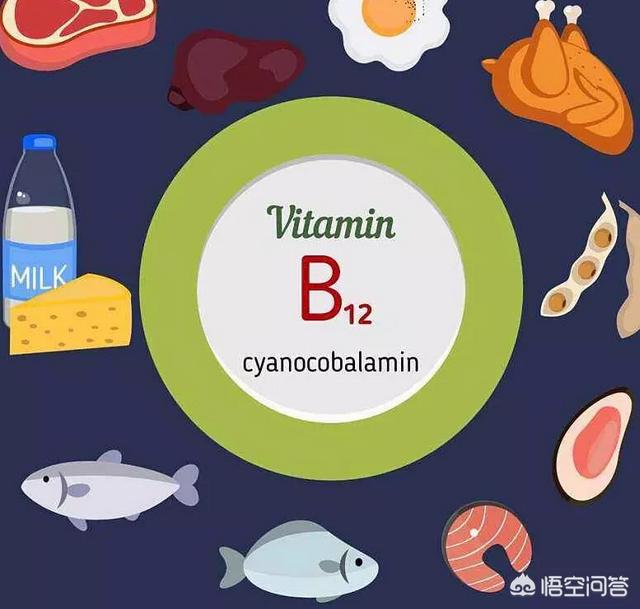
Conditions that require long-term vitamin B12 supplementation include those with inadequate intake or malabsorption in food, pernicious anemia, hyperhomocysteinemia, and patients on long-term metformin. Specifically, patients with inadequate intake or malabsorption in food are advised to take 1000ug per day for the first month, with a maintenance dose of 125-500ug per day, patients with pernicious anemia are advised to take 1000ug per day of supplementation, patients taking metformin for a long time are advised to pay attention to the proper intake of foods containing vitamin B12, such as meat, eggs, fish, and liver, and hyperhomocysteinemia is advised to take a supplement of 400ug, if the cause of the disease is difficult to remove, need to take medication for life.
The bad side is certainly there, for example, after taking the drug may occur asthma, urticaria, eczema, and even anaphylactic shock, facial swelling, chills, nervous excitement, palpitations, causing uric acid increase, induced gout, resulting in low blood potassium and promote the growth of malignant tumors, etc., the opposite of what is extreme, strict control of the dose of the drug and the taking of the course of treatment, in order to ensure that the safety of your use of the drug.
References:
Expert Consensus on the Diagnosis and Treatment of H-Hypertension (2016)
Expert Consensus on the Clinical Use of Metformin (2016)
Guidelines for the Recognition and Management of Vitamin B12 Deficiency (2013BC)
Hello, I am a medical worker Zhang, a practicing physician, can popularize health knowledge for everyone, if you know more, pay attention to me!
Vitamin B12, also known as cobalamin, is synthesized in nature by microorganisms and cannot be made by higher plants or animals; it is the only vitamin that requires the help of an intestinal secretion (endogenous factor) to be absorbed. Some people who are deficient in this endogenous factor due to gastrointestinal abnormalities may develop pernicious anemia even if they have adequate dietary sources. Vitamin B12 is largely absent from plant foods, and it has a long residence time in the intestinal tract, requiring about three hours (compared to a few seconds for most water-soluble vitamins) to be absorbed.
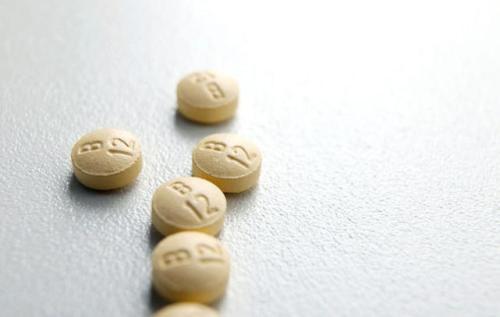
What are the benefits of vitamin B12?
1. Improve the utilization of folic acid, together with folic acid, synthesize methionine (synthesized from homocysteine) and choline, and synthesize cyanocobalamin Schengen precursor substances such as methylcobalamin and coenzyme B12 in the process of generating purines and pyrimidines, which are involved in the methylation process of many important compounds. In vitamin B12 deficiency, the transfer of methyl groups from methyltetrahydrofolate is reduced, turning folic acid into an unavailable form and leading to folate deficiency.
2. Maintain the metabolism and function of nerve myelin. Vitamin B12 deficiency can cause nerve disorders, spinal cord degeneration, and can cause severe psychiatric symptoms. Vitamin B12 deficiency can lead to peripheral neuritis. The early manifestations of vitamin B12 deficiency in children are abnormal mood, dull expression, slow reaction, and finally lead to anemia.
3、Promote the development and maturation of red blood cells. Converts methylmalonyl coenzyme A into succinyl coenzyme A, which participates in the tricarboxylic acid cycle, in which succinyl coenzyme A is related to the synthesis of hemoglobin.
4, vitamin B12 is also involved in deoxyribonucleic acid (DNA) synthesis, fat, carbohydrate and protein metabolism, increase nucleic acid and protein synthesis.
What symptoms can vitamin B12 deficiency cause?
1, pernicious anemia (red blood cell deficiency); 2, menstrual disorders; 3, yellowing of the eyes and skin, localized (very small) redness and swelling of the skin (not painful, not itchy) and accompanied by moulting; 4, nausea, loss of appetite, weight loss; 5, whitening of the lips, tongue, and gums, bleeding gums; 6, headache, memory loss, dementia; 7, may cause mental depression; 8, cause nucleated megaloblastic anemia (pernicious anemia); 9, spinal cord degeneration, nerve and peripheral nerve degeneration; 10, inflammation of the mucous membranes of the tongue, mouth, and digestive tract; 11, early manifestations of children's deficiency of vitamin B12 are abnormal mental moods, dull expressions, and mental retardation. anemia); 9, spinal cord degeneration, nerve and peripheral nerve degeneration; 10, inflammation of the tongue, mouth, mucous membranes of the digestive tract; 11, the early manifestations of vitamin B12 deficiency in children are mental mood abnormalities, dull expression, less crying, slow reaction, sleepy and other symptoms, and finally will cause anemia.

What are the disadvantages of taking vitamin B12?
In general, normal doses do not have any adverse reactions, a few patients can cause rash, itching, diarrhea, allergic asthma, and hyperuricemia, but the incidence is low, and very rarely have anaphylaxis.
What foods contain vitamin B12?
Vitamin B12 is mainly found in meat and its products, including animal offal, fish, poultry, shellfish mollusks, eggs, milk and dairy products, and small amounts of vitamin B12 are also found in fermented foods. Foods that are moderately rich in vitamin B12 include milk and milk products, and some seafood, such as crab, sardines, and trout. Foods that are low in vitamin B12 include chicken, seafood such as lobster, swordfish, halibut, scallops, and fermented foods.
Vitamin B12 Precautions
1, the elderly, vegetarian and do not eat eggs and dairy products must be supplemented with vitamin B12. 2, if you often socialize and drink a lot of alcohol, then supplementing vitamin B12 is very important. 3, during menstruation or pre-menstrual supplementation of vitamin B12 is very beneficial. 4, pregnant women and breastfeeding women should be supplemented. 5, should be avoided with chloramphenicol otherwise it can counteract the hematopoietic function of vitamin B12. 6, in vitro experiments have found that vitamin C can destroy the blood concentration of vitamin B12 when given simultaneously or long-term high intake of vitamin C can reduce. In vitro experiments found that vitamin C can destroy vitamin B12 at the same time to give drugs or long-term intake of large amounts of vitamin C can make the vitamin B12 blood concentration decreased. 7, aminoglycoside antibiotics, p-aminosalicylic acid phenobarbital phenytoin sodium paracetamol and other anticonvulsants and colchicine and other anticonvulsant drugs and colchicine can reduce the vitamin B12 from the intestinal tract absorption. 8, the cholestyramine can be combined with the vitamin B12 to reduce its absorption.
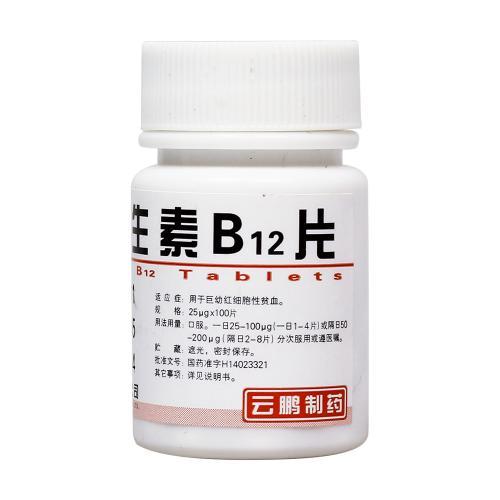
Conclusion: The first thing that is clear is that Vitamin B12 should not be taken in excess, and anything that is good can cause some problems after an overdose, so it is best to use it against medical advice or instructions. Secondly, vitamin B12 can be consumed by the general population, especially those who like to consume a vegetarian diet, and there are hardly any particularly adverse reactions.
Hello, I am a pharmacist who has been working in a hospital for many years and is a state licensed pharmacist and would be honored to answer your questions.
When it comes to vitamin B12, a member of the family of water-soluble vitamins, many people who do not have systematic contact with pharmacy or nutrition may not know it very well, before answering the question, let's build a knowledge of vitamin B12.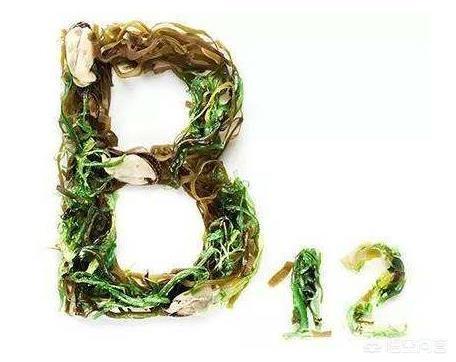
If we were to give an overview of VB12 in very concise terms, we prefer to use the term clinically"Patron Saint of Blood Vessels."The title. This is because it is most commonly used to prevent anemia from occurring. So some of you may ask, how was this vitamin discovered? In fact, any kind of scientific achievements, in addition to hard work, sweat, sudden inspiration, luck is also an essential part. Just like when theSeventh Nutrient - Dietary FiberIt was also at first thought to be"Chicken Ribs"The existence of VB12 was not discovered until people dug deeper into it and realized that it shines in terms of nutrition, and the discovery of VB12 has more or less a theatrical component to it.
That said, at the beginning of the twentieth century, a mysterious lethal disease appeared in many hospitals in Europe and the United States, and its major manifestation was theanemic. Most of the patients showed tiredness, yellowish color, and the number of red blood cells in the blood was only about one-third of normal people, although many medicines and treatments were tried to no avail. Until in the joint efforts of scientists and doctors, it was found that by letting the patients eat some animal liver properly, the symptoms will be well relieved, which aroused the curiosity of many people engaged in this work. Later, with the development of science and technology, people were able to extract this beneficial substance from the liver, which is what we are talking about today.Vitamin B12They are also referred to in some places asCobalamin, cyanocobalamin.. It is also the only vitamin in the family of vitamins that contains metal elements!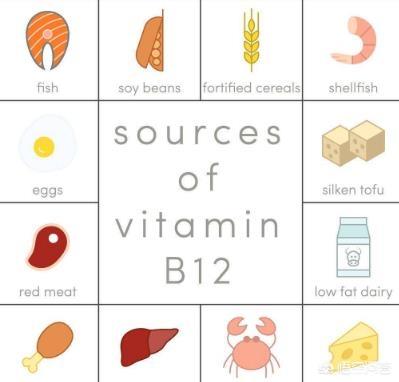
在efficacyThe most prominent effects of VB12 arePrevention of anemia symptomsThe mechanism of action is to assist in the regulation of erythropoiesis by folic acid in the body and to promote iron absorption. Its mechanism of action is to assist folic acid in the body to regulate the production of red blood cells, and can promote the absorption of iron. If we are deficient in vitamin B12, it will cause defects in DNA synthesis as well as impaired synthesis of hemoglobin, which in turn will lead to the occurrence of anemia. In addition, VB12 can also activate amino acids, which is conducive to protein synthesis and can promote the growth and development of young children.
After a good brief introduction to the issue of VB12 sources and effects, let's take a look at the clinical adverse effects of VB12 and how to take it.
Apart from supplements, which we will not explore, VB12 is commonly found in clinical practice in tablets, mostly in bottles or boxes of 25ug. In terms of dosage recommendations.We recommend oral, 1-4 tablets a day or 2-8 tablets every other day, in divided doses or as directed by your doctor.That is, in general, the dose should not exceed 4 tablets per day! Of course, this type of medicine is usually used in the treatment of megaloblastic anemia.Therefore, it is necessary to take the medication according to your physical condition, pathology and with the doctor's prescription as the first prerequisite!
go so far as toAdverse effectsThe most common conditions are hypokalemia and hyperuricemia.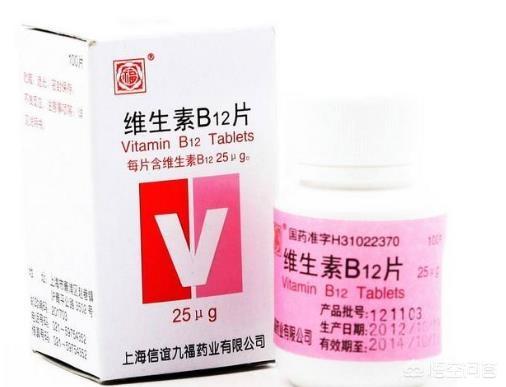
If you like my answer, welcome to follow the headline number: [Mu Ge Night Talk]. I will share some medicine application and nutritional and health knowledge regularly, thank you!
Vitamin B12, also known as cyanocobalamin, is used as a medicine, and as the saying goes, it's a poison, so what are the downsides of taking vitamin B12?
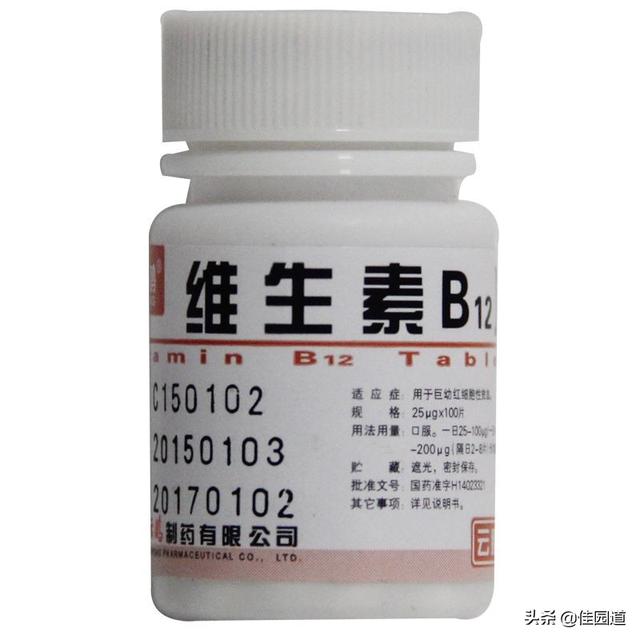
Vitamin B12 is mildly toxic, and although vitamin B toxicity is relatively mild, it can still cause anaphylaxis.
Additionally taking large doses of vitamin B12 can lead to potassium deficiency or hypokalemia in patients within a week of taking it.
Having said that vitamin B12 is bad, what are those benefits of vitamin B12?
Vitamin B12 participates in many biochemical metabolic reactions within the human body, participating in the recycling of tetrahydrofolate, and as a coenzyme also participates in protein synthesis. When vitamin B12 is deficient, DNA synthesis in the human body is impeded, resulting in megaloblastic anemia. In addition, vitamin B12 can promote the fat metabolism intermediates involved in the final metabolic pathway of the three major nutrients in the tricarboxylic acid cycle, thus maintaining the integrity of nerve fiber function.

Vitamin B12 is used to treat megaloblastic anemia and pernicious anemia caused by vitamin B12 deficiency. Vitamin B12 is also used to treat trigeminal neuralgia, sciatica, optic atrophy, and optic neuritis. High doses of vitamin B12 can also be used to treat cyanide poisoning by converting cyanide to cyanocobalamin.
In general, a normal diet of pork, eggs, chicken, duck, fish, beef, and dairy products will not cause vitamin B12 deficiency, and if there is no deficiency, there is absolutely no need to supplement with medicinal vitamin B12.
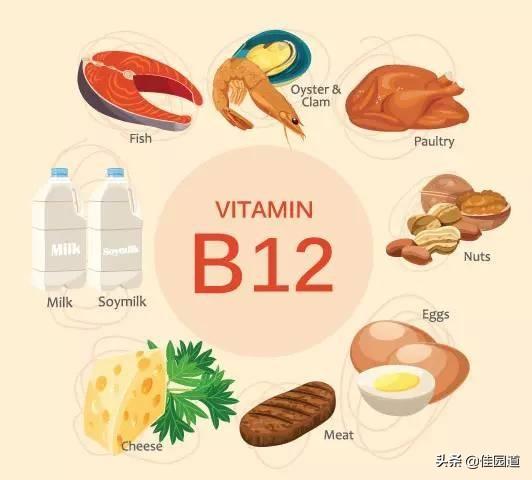
(Images from the network, if any infringement please contact to delete, this content is for reference only, not as a basis for diagnosis and medication.)
Vitamin B12 is an anti-anemia drug. It is involved in methyl conversion and folate metabolism in the body and promotes the conversion of 5-methyltetrahydrofolate to tetrahydrofolate. When deficient, it leads to DNA synthesis disorder and affects the maturation of red blood cells. It also promotes the conversion of methylmalonic acid to succinic acid and participates in the tricarboxylic acid cycle. This action is related to the functional integrity of nerve fibers, and the nerve damage in vitamin B12 deficiency may be related to this. It is mainly used in megaloblastic anemia, and can also be used in adjuvant treatment of neuritis. In vivo process] After intramuscular injection, the absorption is rapid and complete, about 1 hour blood concentration peak; body distribution is wide, but the main storage in the liver, the total storage capacity of adults 4 ~ 5mg, most of the 8 hours by the renal excretion, the larger the dose, the more excretion. Usage and dosage] Intramuscular injection. Adults, 0.025~0.1mg a day or 0.05~0.2mg every other day, when used for neuritis, the dosage can be increased. Children, 25~100ug, once a day or every other day. Avoid repeated administration at the same site, and be especially careful with neonates, premature infants, infants, and young children. Adverse reactions and precautions] Intramuscular injection may occasionally cause rash, itching, diarrhea and allergic asthma, but the incidence is low, and anaphylactic shock is rare, and should not be abused.
Hello, I am an internist who has been practicing for many years, we often hear more vitamin supplementation in our normal life, what is vitamin in the end? It is a human and animal to maintain normal physiological functions and must be obtained from the food of a class of trace organic substances, in our human body growth, metabolism, development process plays an important role, can be roughly divided into fat-soluble vitamins and water-soluble vitamins, which vitamin B12 is a small class of them, such as the subject said, what are the disadvantages of taking vitamin B12? How should I take it? I will talk about my opinion below.
What is Vitamin B12?
●Tracing back as far as 1948, the American medical scientist Ricks isolated a red crystal from the liver, which was thought to be an endogenous factor in the fight against pernicious anemia. This red crystal was then named cyanocobalamin, and later merged into the B vitamins, sorted into vitamin B12. The vitamin B12 that our body needs daily is mainly obtained from food. You can often find vitamin C tablets and vitamin B1 tablets, so are there any pharmaceutical preparations of vitamin B12? Of course there are.
● There are four members of the vitamin B12 family of drugs, including cyanocobalamin (vitamin B12), methylcobalamin, adenosylcobalamin, and hydroxocobalamin (the latter three are the active coenzyme forms of vitamin B12). These four drugs are structurally different, distinguished by the cyano, methyl, deoxyadenosine, and hydroxyl positions attached to cobalt in their structures. After cyanocobalamin is absorbed orally or by injection, part of it is stored in the liver and the other part is converted to methylcobalamin, adenosylcobalamin, and hydroxocobalamin. Methylcobalamin, adenosylcobalamin and hydroxocobalamin do not need to be converted after oral intake or injection, and they can directly play a role in the body, so clinically, like some diabetic patients with peripheral neuropathy symptoms such as numbness of the hands, numbness of the feet will take methylcobalamin tablets for treatment.
What are the disadvantages of taking vitamin B12 and how should I take it?
● I feel a bit confused by this question, are we talking about medication side effects? Generally speaking, there are several precautions. First, if you are a patient with Leber's disease (familial hereditary retrobulbar optic neuritis and cigarette smoking amblyopia), serum vitamin B12 is abnormally elevated, and treatment with vitamin B12 can exacerbate optic atrophy, which is something you need to be aware of. If you are a patient with megaloblastic anemia, there is not only vitamin B12 deficiency, but also folic acid deficiency, if you only supplement vitamin B12, then although the blood picture can be improved, but it can cover up the clinical manifestation of folic acid deficiency, so it should be supplemented at the same time, in addition, in the use of vitamin B12 treatment, it is important to pay attention to the follow-up within 48 hours. In addition, within 48 hours of treatment with vitamin B12, attention should be paid to the review of blood potassium to prevent the emergence of hypokalemia and life-threatening, which is a need to pay attention to.
So at this point I'm going to expand a little bit on that, which is vitamin B12 and which is methylcobalamin, and my recommendation is that for peripheral neuropathy, methylcobalamin is more effective than vitamin B12. My recommendation is that for peripheral neuropathy, methylcobalamin is more effective than vitamin B12, and for megaloblastic anemia due to vitamin B12 deficiency, methylcobalamin and vitamin B12 are equally effective, and can be considered alternatives. If we were to compare methylcobalamin and adenosylcobalamin, the theory is that methylcobalamin is better for neuropathy and adenosylcobalamin is better for anemia. There is not much to be explained in terms of administration, like vitamin B12 tablets are taken orally, 25-100 μg (1-4 tablets) a day or 50-200 μg (2-8 tablets) every other day, in divided doses. Methylcobalamin tablets are also taken orally. Usually, adults take 1 tablet (0.5 mg) three times a day, and then increase or decrease according to age and symptoms.
Aggregate summary
As with other vitamins, although it is a trace organic substance, usually easier to obtain in food, but the lack of it is not. Because it can promote the development and maturation of red blood cells, and folic acid together, can improve the utilization rate of folic acid, used in the treatment of megaloblastic anemia. It can also improve brain metabolism, enhance memory, participate in the synthesis of neurotransmitters, maintenance to maintain the metabolism and function of the nerve myelin sheath, for the treatment of Alzheimer's disease and peripheral neuropathy. In addition, it can also participate in the metabolism of homocysteine, reduce blood homocysteine levels, so it can also be used for hyperhomocysteinemia. However, medicines are often poisonous, so the specific indications, dosage and duration of medication should be consulted with a professional doctor or pharmacist.
Author's Message:This answer does not constitute medical treatment recommendations, nor does it have medical guidance, only for the use of health science. Spend hours of time synthesized and summarized, this article does not join the column charges, gratuitous, free for everyone to read. May those who are misled by rumors, no medical knowledge, health care concepts group help!. Headline is an open platform, everyone can learn from each other, discuss with each other, if there are different points of view can be comment area to talk about their own views. If you feel that you have learned to help, do not be stingy, offer a love, point a praise, forward to help more people, thanks for the support.
What are the disadvantages of taking vitamin B12? How should I take it?
Vitamin B12, or cobalamin, is one of the latest discoveries of a B group of water-soluble vitamins, a class of cochineal-like compounds containing a cochineal ring. The common name vitamin B12 refers to cyanocobalamin, which is used in nutritional products, food fortification and pharmaceuticals. Vitamin B12 plays a key role in maintaining normal hematopoiesis as well as neurological function. It is involved in the metabolism of the body's cells, affects DNA synthesis and regulation, and is also involved in fatty acid synthesis and energy production.
The human body can not synthesize itself, so it all depends on the intake from rich food, meat, eggs, fish, liver and other animal foods are rich in content, except seaweed and nori, other plants do not exist, the daily requirement of adults is about 2-5ug.
Although the content is low and the need is low, it is not possible to do without it! Clinical manifestations of vitamin B12 deficiency are mostly non-specific, such as fatigue, megaloblastic anemia, skin pigmentation, neurological damage, and digestive damage.
1. Anemia
Anemia caused by vitamin B12 deficiency, like folic acid deficiency, is megaloblastic anemia.
Vitamin B12 deficiency status is not associated with anemia, either in the elderly or in populations with a low intake of foods of animal origin. Vitamin B12 supplementation in vitamin B12-deficient populations did not affect complete blood counts.
2. Hyperhomocysteinemia
Blood concentrations of total homocysteine above 10 μmol/L increase the risk of atherosclerosis and venous thrombosis. Vitamin B12 is involved in the metabolic process of methylation of homocysteine and is an essential cofactor for methionine synthase. Vitamin B12 and folate concentrations correlate with blood homocysteine concentrations.
3. Neuropsychiatric diseases
Vitamin B12, along with folic acid, has a pivotal role in maintaining normal function of the central nervous system (CNS).SAM is an important donor of methyl groups in the brain, and imbalances in methylation are a cause of neurological and psychiatric disorders.
4. Diseases of the digestive system
Vitamin B12 deficiency affects the synthesis of DNA in the mucosal cells of the digestive tract, making the function of the digestive tract impaired, resulting in a range of digestive symptoms such as indigestion, bloating, and diarrhea.
How do I take it?
Vitamin B12 is a water-soluble vitamin, mainly absorbed in the small intestine, taken on an empty stomach before meals, will quickly pass through the stomach into the small intestine and be absorbed, resulting in the drug has not been fully absorbed and utilized, it is discharged from the body. If taken after meals, there is food as a buffer, slowing down the absorption of the drug, so that vitamin B12 is utilized more fully, therefore, vitamin B12 should be taken after meals.
I am Pharmacist Wang, every day and you talk about health, welcome to pay attention! If you still have questions about health, welcome to leave a message to consult, after seeing will be the first time to respond.
What are the disadvantages of taking vitamin B12? How should I take it?
When I saw this, I thought long and hard about how to tell it like it is.
Let's first understand what vitamin B12 is.
Vitamin B12 is not a substance, it is a generic term for a group of vitamins that contain cobalt, mainly cyanocobalamin, hydroxocobalamin and methylcobalamin. Clinically, there is a mixture of vitamin B12 that can be used, and there is also a subdivision of cyanocobalamin, hydroxocobalamin and methylcobalamin that can be used. Of these, methylcobalamin is more widely used.
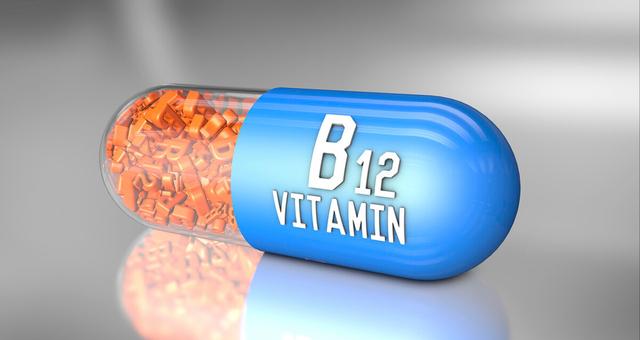
Let's look at what vitamin B12 does.
Vitamin B12 works in two main ways.
One is involved in the conversion of folic acid and homocysteine conversion.
Folic acid works to treat megaloblastic anemia, and folic acid requires the involvement of vitamin B12 in a chemical reaction to work in the treatment of this problem. If vitamin B12 is deficient it can lead to anemia.
People with too much homocysteine are prone to forming blood clots, a high risk indicator for cerebral infarction, and the conversion of homocysteine to methionine requires vitamin B12 to deliver the substance to carry out the chemical reaction. If vitamin B12 is deficient, it can lead to hyperhomocysteinemia.
So vitamin B12 is essential in both of these transformations.
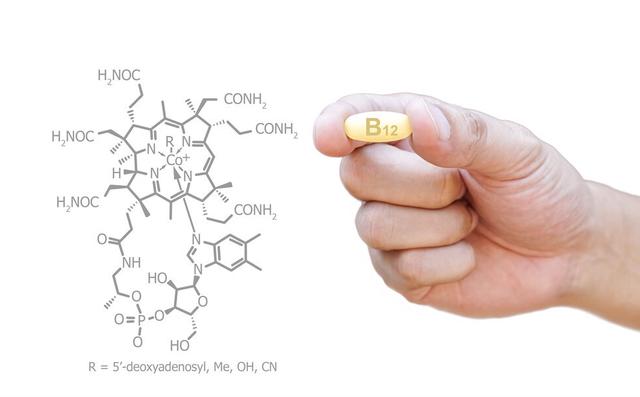
Another is that vitamin B12 maintains nerve integrity.
There is a layer of myelin on the surface of the nerves, which plays a role in protecting the nerves, and one of the constituents of this myelin to be generated requires vitamin B12 to be involved in the reaction. If vitamin B12 is deficient, it will lead to abnormalities in the myelin composition of the nerves, destroying the completeness and function of the nerves, and not effectively restoring the myelin function in patients with nerve injuries.
Where is vitamin B12 found?
Vitamin B12 is oddly enough widely found in animal livers, egg yolks, and milk. But it's largely absent from plants, and is said to be found only in purslane and kelp, so it's not clear where the vitamin B12 in herbivores comes from.
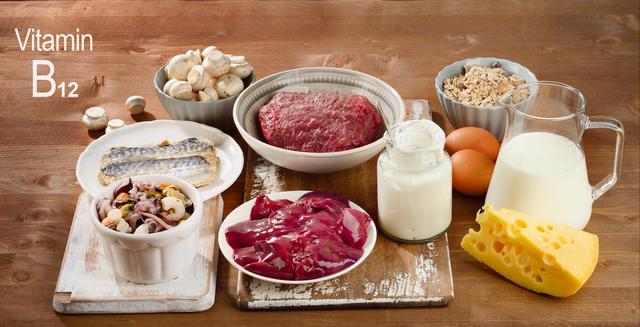
What problems require vitamin B12 supplementation?
The first are patients with pernicious anemia and megaloblastic anemia.
It has been said above that vitamin B12 is involved in the process of folic acid metabolic reaction, if deficient, folic acid can not function, folic acid is useless, it can not promote the expression of the body's gene signals, blood cells, especially red blood cells, there is no way to ripen, red blood cells are not mature, it can not function without maturity, anemia manifestation.
The second is neurological disorders.
Nerve damage, more commonly known as demyelinating lesions, is a time when vitamin B12 supplementation is needed to promote myelin production, and common disorders include neuritis, nerve atrophy, and neuralgia.
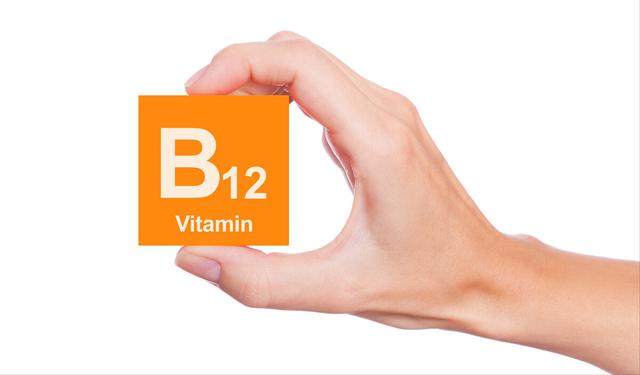
There are also supplements that are needed for gastrointestinal problems.
Vitamin B12 taken orally in is bound by a glycoprotein in the stomach that is insoluble in gastric acid so that it can be absorbed in the ileum with the protective properties of gastric glycoproteins. If a person with a major gastric resection or atrophic gastritis is not able to secrete this glycoprotein, the vitamin B12 is digested by the gastric acid and cannot be absorbed. Problems with absorption in the ileum can also lead to vitamin B12 deficiency.
Vitamin B12 supplementation in this case needs to be done by injection; oral is not effective.
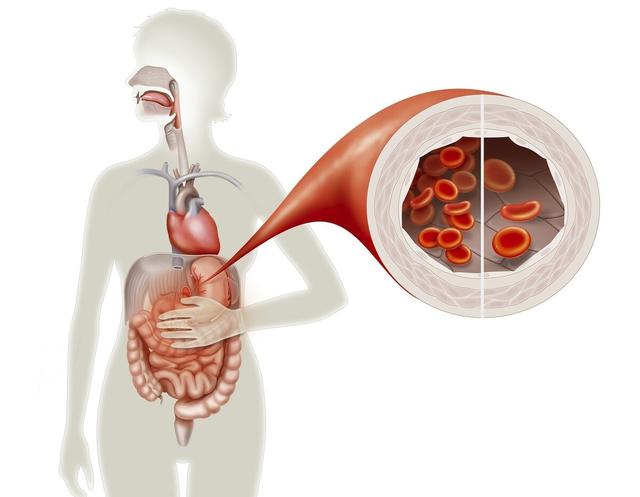
Is there a downside to taking vitamin B12?
We should be clear that vitamin B12 is non-toxic, only a few more sensitive people may be allergic to vitamin B12. The main allergic reactions are induced asthma, urticaria and other allergic diseases after taking the drug, and even anaphylactic shock , facial swelling, chills, nervous excitement, palpitations, causing increased uric acid, induced gout and so on.
How should I take it?
Vitamin B12's two roles are clearly targeted, if these two types of diseases, basically does not belong to the scope of health care, need to go to the hospital to seek standardized treatment, as long as the doctor's orders to take it is good, do not recommend their own private use. If you really need, you can use according to the instructions, this side does not carry out the specific dose of science.
Well, this is some of my understanding of vitamin B12, science article, not easy to disseminate, looking forward to everyoneRetweet, Follow, Like, if you have any questions, leave them in the comments section.
I had previously specialized in the Advanced National Dietitian while working on my Masters, and then took the Licensed Traditional Chinese and Western Pharmacist exam when I was working. On the dietitian and clinical side of things, it's pretty much all about recognizing the positive effects of vitamin B12. However, I did find in my work that there were patients who came to be hospitalized because of vitamin overdose, and these few patients were from primary hospitals and came to be hospitalized because of unclear diagnosis and poor treatment results.
What are the disadvantages of overdosing on vitamin B12? And how can you tell if you are overdosing?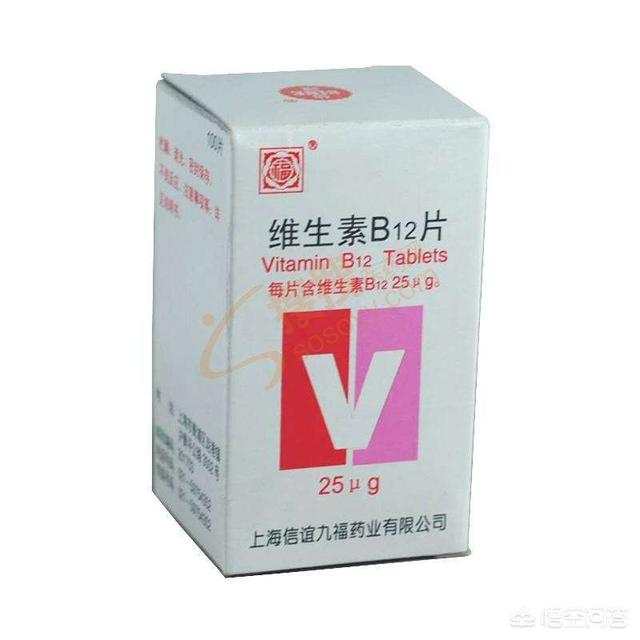
Vitamin B12 is a coenzyme that participates in various enzyme systems in the body and is the least abundant of the vitamins that the body needs on a daily basis. Excessive intake can lead to folic acid deficiency, which in some ways indirectly increases cardiovascular risk. In addition, allergic reactions such as asthma, hives, eczema, swelling of the face and chills can occur. However, on the whole, vitamin B drugs are safe. Vitamin B12 is used clinically to nourish nerves, improve numbness due to peripheral nerves, and to combat anemia (promoting regenerative synthesis of red blood cells) to maintain growth and development in adolescents.
However, on the whole, vitamin B drugs are safe. Vitamin B12 is used clinically to nourish nerves, improve numbness due to peripheral nerves, and to combat anemia (promoting regenerative synthesis of red blood cells) to maintain growth and development in adolescents.
As the saying goes, medicine is better than food, and vitamin B12 is found in animal liver and dairy products. It is important to note that patients are more prone to vitamin B12 deficiency if they have had a gastrointestinal resection. This is because the gastrointestinal tract can secrete prohormones.
If there's anything else you don't understand, get back in touch!
There are three main nutrients in our body, namely sugars, fats and proteins, but it is not enough for the human body to rely on these three substances alone, it also needs the participation of vitamins and minerals and other nutrients. Take the main character of today's vitamins, there are many types of vitamins in itself, and different types of vitamins have not quite the same role. In order to let you have more knowledge and understanding of vitamin B12, I'll share some knowledge about it.
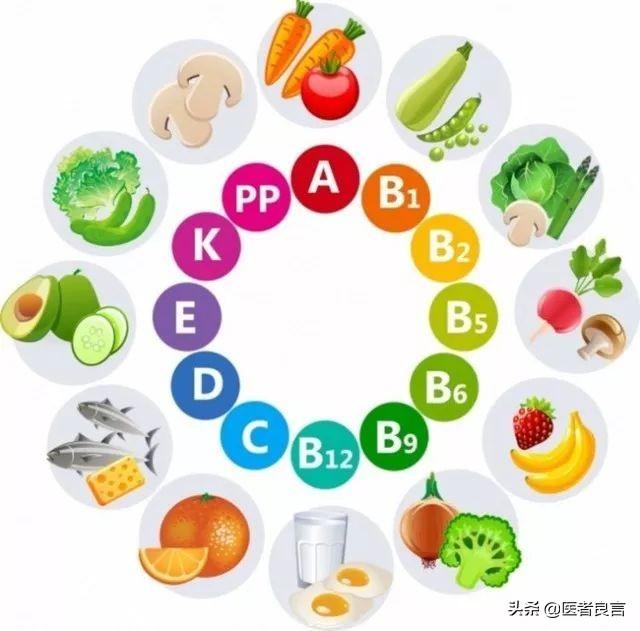
1. What is vitamin B12?
There are actually more types of vitamins, but there are 13 main types of vitamins that the human body needs. By the name of vitamin B12 alone, it is one of the many types of vitamins, except that vitamin B12 has some characteristics of its own.Vitamins can also be divided into water-soluble and fat-soluble according to solubility, fat-soluble vitamins are mainly four major categories, respectively, vitamin A, vitamin D, vitamin E and vitamin K. The remaining vitamins are water-soluble.So vitamin B12 is also a water-soluble vitamin.
It may be that people don't know much about the characteristics of water-soluble and fat-soluble vitamins.Generally water-soluble vitamins are not easily accumulated in the body, and the lack of accumulation also means that it is not easy to cause poisoning.But fat-soluble vitamins are different, the human body lacks them when the symptoms will not be more obvious, only when the lack of more serious when there will be obvious symptoms. At the same time, fat-soluble vitamins are easy to accumulate in the body, so it is easy to cause poisoning symptoms, so fat-soluble vitamins can not eat too much.
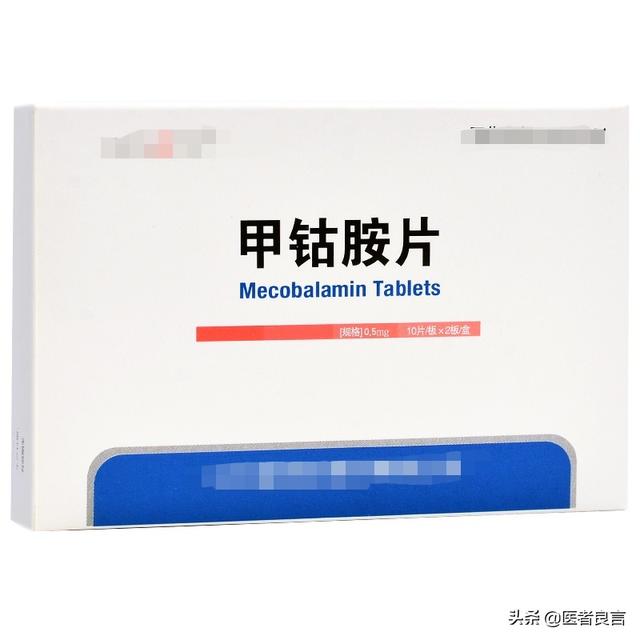
Vitamin B12, as a type of vitamin, still has characteristics that other vitamins don't have, such asIt is the only vitamin that contains a metallic element. The metallic element that vitamin B12 contains is cobalt, and because of this, vitamin B12 has nicknames on the market, the more common one being methylcobalamin.Also, vitamin B12 is not quite the same as the usual water-soluble vitamins; it accumulates in the body.

For the human body, there are two main ways to source vitamins, namely self-synthesis and food intake, the most important source of vitamin B12 is food intake, and plants generally do not contain vitamin B12.Foods that are rich in vitamin B12 are mainly animal-based, such as liver, beef, pork, clams, eggs, and fish.Usually if you want to supplement vitamin B12 can be appropriate to increase the intake of meat food. However, it should be noted that although the meat can supplement vitamin B12, but the real lack of this vitamin when simply rely on dietary supplements is difficult to meet the demand, or need to take oral vitamin B12. If the meat to eat more, will also increase the risk of hyperuricemia, fatty liver and hyperlipidaemia and so on.
2. What are the disadvantages of taking vitamin B12? How should I take it?

I feel a bit strange when I see this question because vitamin B12 itself is a drug and it is over-the-counter, over-the-counter meaning that ordinary people can buy and take it on their own, and it is relatively safe.But also need to pay attention to, is a medicine three poisons, vitamin B12 although safer, but if the amount of too much to take will still have some adverse reactions, generally speaking, if in accordance with the instructions for use of the dosage given, then it is safer.
For normal people, if they eat a normal diet, they are usually not deficient in vitamin B12. However, if you have had stomach surgery, poor digestion, etc., you may be deficient in vitamin B12.

If I had to say there are some bad things about taking vitamin B12, there are some.If the amount of vitamin B12 taken is large, it may cause an increase in blood uric acid and even induce goutThis is mainly because vitamin B12 can promote the decomposition of nucleic acids, nucleic acids have purine structure inside, so nucleic acids in the process of decomposition will produce a lot of purine, causing hyperuricemia and gout is not surprising.
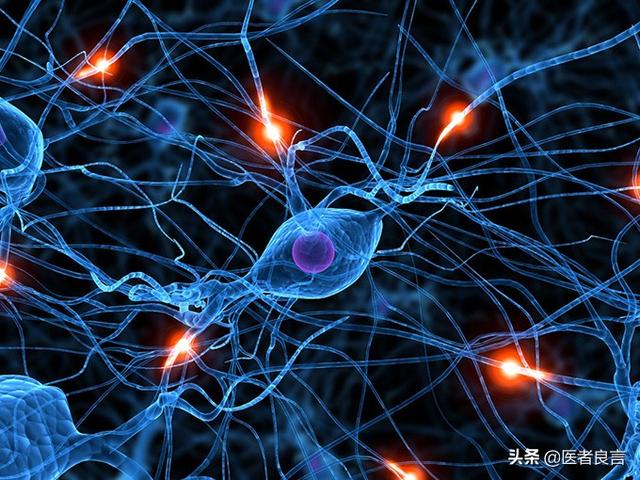
Also, according to some reports, vitamin B12 may cause hypokalemia and irreversible nerve damage.The mechanism by which vitamin B12 administration causes hypokalemia is not clear. If symptoms such as bloating, fatigue, or even panic occur during vitamin B12 administration, one needs to be alert for hypokalemia. There are some references in the literature that if vitamin B12 is taken for more than 3 months, it may cause irreversible nerve damage, and patients may experience symptoms such as headache and dizziness.
Vitamin B12 is used in a wide range of clinical applications, but in general terms, theVitamin B12 can play a role in treating diseases such as megaloblastic anemia, peripheral neuropathy, Alzheimer's disease, and hyperhomocysteine.You may hear peripheral neuropathy is not quite understand, in fact, life in the cervical spondylosis, diabetes, hypertension and other diseases caused by numbness of the limbs and other symptoms belong to a kind of peripheral neuropathy, this time to take the effect of vitamin B12 can still be.
There is nothing special about taking vitamin B12, as long as you take the dosage as directed.Generally speaking, you can take 25-100 ug per day or 50-200ug every other day, which needs to be adjusted in accordance with the patient's physical condition and the severity of symptoms.
In conclusion: Vitamin B12 is a water-soluble vitamin and an over-the-counter medication, so it is relatively safe and not harmful as long as the dosage is followed according to the instructions for use. However, if large amounts of vitamin B12 are taken, there is a risk of hyperuricemia, hypokalemia, and irreversible nerve damage. There is nothing special about the use of vitamin B12, you can take 25 to 100ug per day or 50 to 200ug every other day, and you can take it with warm boiled water!
This question and answer are from the site users, does not represent the position of the site, such as infringement, please contact the administrator to delete.